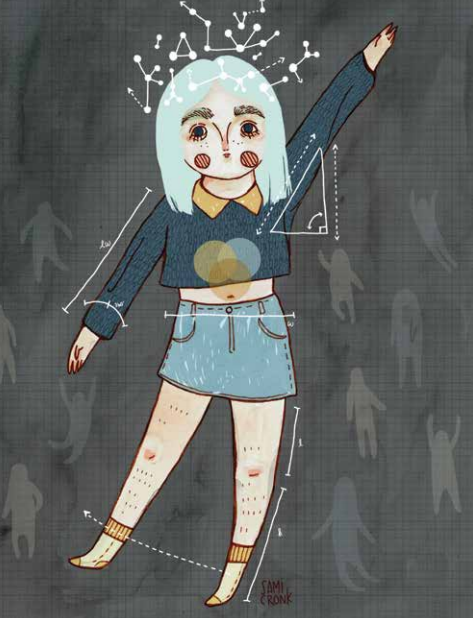
Illustrations by Sami Cronk (samicronk.com)
I hereby solemnly swear this is not another essay about body image and self-esteem. It’s more of an existential crisis and I definitely talk about death. Lately, my eyes somewhat glaze over when I see memes about “real” bodies, Photoshop, and beauty. Not because it’s not a thing, so much, as I think it just misses my real question about bodies, which is: What the *#!@ is this whole body thing all about, anyway? What is going on with bodies?
Why do I have one? What is it? Whaaat?
Am I seriously the only adult that thinks it’s bizarre that we have bodies? I know babies know what I am talking about. Watching them constantly re-discovering things like fingers and faces is hilarious. Babies clearly don’t expect to encounter them, bodies: still getting used to them. Bodies baffle babies, and me along with them.
Somewhere after that stage of life, though, people seem to stop questioning the body thing. Well, I haven’t stopped. Kids for example definitely seem more accepting of bodies than babies.
Sure, everybody poops, they say, I have a book about it. What’s the big deal?
That’s just the way it works. And I am the weirdo grown-up left alone going, yeah, but whaaat? How weird is that, that everybody poops? Everybody?! Everybody POOPS! That’s so weird! We ALL do the SAME poop thing together, ONE BIG HUMAN POOP FAMILY!
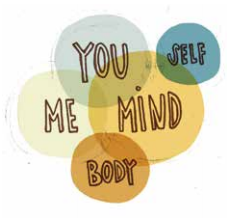
It’s bizarre to me that human beings, for all our questions and art forms and inventions and winter Olympics and religions and dreams, boil down to creatures of bodies. As a friend recently put it, we just eat, poop, copulate, and die. For some (I’m looking at you, religion and popular culture and longing), this is a problem.
The body thing isn’t enough the way it is, or it’s simply bad. Bodies become the obstacle between us and purity/eternity/ beauty/glory/whatever-we-think-is-better, an obstacle between us and the way we think it ought to be. And yet we have to have a body because, well, we just do.
So our relationship with our body becomes complicated. We have to fix it. Discipline it. Starve its appetites, sometimes, or fence them in safely. But, dear god, we must control and dominate it lest it dominate us. My question has always been: Aren’t our bodies…us? Isn’t our relationship with our bodies, fundamentally, a relationship with our very selves? And if yes, then why do I separate myself from my body, even in my own internal language about it? I mean I have to have a body to even have language, right?
A brain to think, a tongue to say, fingers to type the question: Am I my body? It’s very meta.
A dear friend, the amazing Larissa Dzegar, and I co-created a show together in New York City a few years back exploring questions about bodies. We simply called it “The Body Stories” because we’re creative like that. We asked a small group of performers to create 5-10 minute vignettes dramatizing their relationship with their bodies. It was a pretty open-ended, fascinating process because I was really curious to see where other brains would take that general phrase “relationship with your body.”
Of course, because the two guys and the one person not in their 20s in the cast ended up dropping out because of schedule conflicts, many of the pieces were about things you’d generally expect young women to focus on: insecurity about beauty, complex relationships with food and weight, desire to be desired. I’d like to do the show again someday with a more diverse mix of ages, races and genders, but we still made some astounding discoveries as a group—the main one, for me, being that everybody struggles to accept their body, its limits, and its goodness.
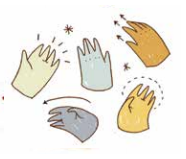
A good tagline for our show might have been “Bodies: can’t live with them, can’t live without them.” We’re stuck with what we’ve got, and our bodies play a fundamental role inour identities. Maybe not the most groundbreaking theatrical discovery,but it felt like a major accomplishmentand affirmation to havethis conversation with other artists and audience members and hear my own questions echoed back to me from other people.
Here I am, though, a couple years later, still asking the same questions. Because there might not be any answers. It’s still bizarre to me that we all know the only way we exist on this planet is ONLY in a body, and yet we seem to be so bad at dealing with this fact all the way up from self-image through healthcare. I mean if you don’t have a body, you can’t be here. Bodies are like the white tie to get in planet earth’s members-only lounge. There’s probably a sign in earth’s driveway that says “No body? No service.”
And we only get ONE body (as far as we can prove). To me, I move to the mystical to try to understand the body thing. I can’t help myself; I was raised in a pretty conservative branch of Christianity, and much as I sometimes fight it that upbringing has permanently affected the way I think about most things—bodies and their hobbies in particular: reproduction, death, food, waste, pleasure, pain, disease, unfairness of size and health and strength and politics. We are our bodies, they exist for a while, then die: that is all we can know for certain. And yet I am constantly pushing past the known and asking myself, what does this all mean, this body
thing? What is it? Why is it? How do we all handle it, share it, and yet live completely and only within the walls of our own cellular structure? What is my body?
Growing up, this was my main take-away about bodies from church: they’ll sin and suffer and die, but don’t panic, there’s a way to save yourself from your body ofdeath. Through faith, you can have God’s spirit LITERALLY live inside you and your body becomes God’s temple. And when this body dies, we get a new one. A perfect one. God loves bodies! New permanent bodies for everyone*! (*Everybody who’s Christian.)
Whoa.
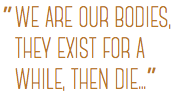
Obviously this is a religious opinion, but let’s just think about that concept for a second, the body as God’s temple thing, because it still blows my mind with its simple beauty. It’s something like the mirror image of Hinduism where our world and bodies all exist only in Vishnu’s dream in his sleeping head, and therefore we are one with God because we exist in his mind—except that in the Christianity I grew up with our bodies are real and the dream of God’s presence is inside them.
God is inside our bodies, or vice versa. In any religion, belief in spirituality lifts our bodies from the physical to the holy, giving our experience on earth a multidimensional, sci-fi feel with a very, very happy ending: union with God and a new kind of life after this body’s death.
If our bodies could literally be God’s temple or God’s dream, every action and aspect of our physical life takes on the nature of devotion and worship. Even pooping is more special. And our earthly bodies become a sort of cocoon from which we will emerge after death even more beautiful and metaphysical than ever. I gravitate toward this. It’s a beautiful, seductive idea, just as hell and damnation and cycles of suffering are ugly, scary, off-putting ideas. The main thing is, though, faith is faith and there’s no way to really know what are bodies are: spiritual vessels, or just material?
They’re a mystery wrapped as a totally obvious, banal reality. Kids seem to get it. I don’t. Recently, on a date, two of us stretched our bodies out on a blanket in Central Park under a shady tree and put one earbud each in one of our ears and listened together to a podcast about Alan Turing.
(People, THIS is how to woo.)
Turing was the genius British mathematician who basically cracked the Nazi code and accelerated the Allied Victory at the end of WWII. After an adventurous and brilliant career as a war hero, Turing was later arrested for homosexuality and chemically castrated by the very British Government he had served. Turing, it turns out, was raised conservatively Christian much like I was. After watching his boyhood love die of consumption, Turing sought his lost love in prayers and clouds but never found him again. Turing eventually concluded this was because the boy was just gone, and that the Christian idea that humans are more than bodies and that we somehow exist after our bodies die was just a lot of rubbish. As an adult he had a sort of reverse conversion and became an atheist, a materialist, a man of science who decided that the material world and our physical bodies are what they are, and that is absolutely all there is to it beyond a shadow of a doubt.
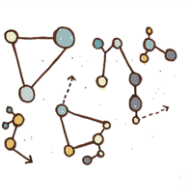
Turing believed that our bodies were the machines of our existence, and that we are essentially conscious machines. Someday he believed humans could build machines that would achieve consciousness, as our equals. The idea rather comforted and set him free, and he went about using his impressive brain/body machine to create machines and codes that changed the world.
Then he got arrested for giving his body the love lifestyle it craved, as homosexuality was still illegal in England. Once his own body was turned against him through forced injections of estrogen, Turing grew so depressed and unrecognizable to himself that he chose to end his own life. He bit into a cyanide-laced apple, just like Snow White in his favorite Disney cartoon. (Oddly, it made me feel better to know I am not the only one who has epiphanies about self, bodies, life and death while watching Disney cartoons—but more on that later.)
Is that what our body is, a machine? Turing’s concept of life as a straightforward material equation also attracts and comforts me. To have the experience of inhabiting the sophisticated, complex machine of a human body can be very exciting when it’s working well, and very scary when it’s not.
I’ll never be able to fully burst out of the cocoon of spiritualizing the human body the way that Turing did (I am a bit of a superstitious caterpillar), no matter that I’ve long since resigned my position as president of the Abstinence Club in High School (yes, that’s a real thing that I did) and now live the life of a sinful artist in New York City (sorry not sorry). Don’t worry, though, spiritualizing the body isn’t all masturbation crosses and chemical castration; one of my favorite Christian saints, St. Francis of Assisi, had a very grounded and humorous view of the body and all the banalities and glories that go along with it. He famously referred to his body as “Brother Ass.”
(By the way, children, St. Francis of Assisi, along with every spiritual leader that has ever existed including Jesus and Buddha and Joseph Smith, also pooped. I am quite sure of this.)
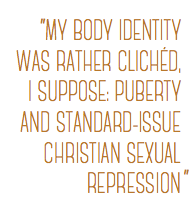
I wanted to escape my own “sister ass” for the longest time, but for no reason as profound or tragic as Turing’s government-ordered body hijacking. My body identity crisis was rather clichéd, I suppose: puberty and standard-issue Christian sexual repression. I felt like my body was in my way, holding me down, and pissing off God.
As if being 12 isn’t hard enough.
Disney’s Mulan came out when I was in junior high going through puberty. I don’t know if you remember Mulan or not but I had a sort of epiphany because of it. There’s that one song Mulan sings when she’s frustrated with the limitations of having a female body in her society. She looks at her reflection in a pool and sings, “When will my reflection show who I am inside?”
Well, I used to sing this to myself in the mirror, crying, because I felt like my body was something that I wasn’t, preventing me from being who I truly was. And I did this a lot. Yup...afraid so.
I hated that when people saw me, they saw me as my body and not as my brain or soul. I wished I could just be a brain or soul and skip the body part because wouldn’t that be nice. Maybe then I could teleport, mind-read, and not have to wear a bra. I could be like the blue fuzzy light-ball Martian’s in Ray Bradbury’s “The Illustrated Man.”
Pleeeease? Why not?!
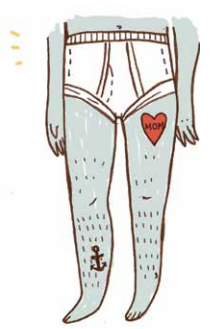
I doubt I’m the only one who ever thought about that: I bet we all want to escape our bodies sometimes, whether for cosmetic or political or health reasons. But one
particular day, when my preteen self was singing that particular Disney song to her naked reflection in the bathroom mirror, I suddenly realized that escaping my body
would mean death.
Death is the only way out of this body.
Duh! That was the moment I really realized that my body will someday die, the light clicked on, and I faced my own mortality for the first conscious time. That moment changed my life and my relation-ship with my body. Not to say I instantly and forever looked on my body as only good, but I’ve certainly appreciated and enjoyed it more ever since. I now know my body is only mine temporarily, like a gift that will one day break.
And so when I wrote my own 5-10 minute vignette in “The Body Stories,” I did an interpretive dance about puberty (like you do) and ventured peace between my body andmy religious traditions and my current questions by writing it a love letter. apologized for hating it and being mean to it. I told it I loved the way it felt, how much I enjoyed its ability to move and touch and taste and eat and have sex and sleep.
And I concluded my love letter like this:
Dear Body, someday you will die, and I will miss you. When you leave me what will I be? Will I be at all? I am afraid to contemplate the absence of you, Body. It is another world, another side, a darkness that I can’t shine light through from here. Someday we will be separated, Body, and the part of me that wanted to escape you will escape. And maybe then I will know whether that part was you all along or someone else, me, or you alone, or us, or another. Until then, we are together. We are one person, you and I, Body, til death do us part. I am married to you in a union stronger than I will ever have with another, a stronger union than anyone can understand, until we are perhaps one. I am you, Body, and I will always wonderif you are also me. You will always be a wonder to me, never answered, only felt.
Stay tuned for our review next week. Already intrigued? Snap up a copy here.






